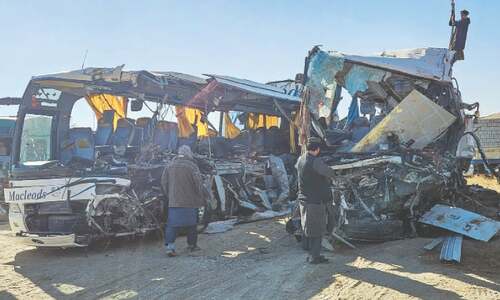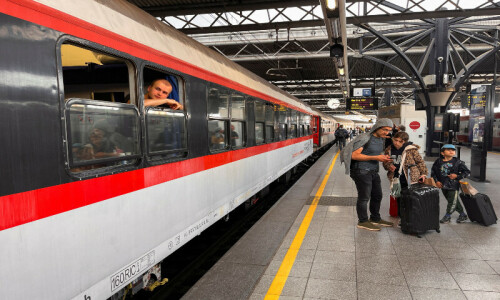
AKCAKALE: Turkey’s parliament on Thursday authorised military action against Syria but insisted it was not a war mandate following deadly cross-border fire that sent tensions soaring.
The vote came as Turkey retaliated for the shelling that killed five Turkish nationals, and Syria apologised and vowed it would not happen again.
Western powers urged restraint, with the United States saying it was outraged and France cautioning that the incident threatened global security.
In Ankara, the Turkish parliament met behind closed doors in an emergency session and agreed to the government’s request to authorise military operations inside Syrian territory.
Turkish Deputy Prime Minister Besir Atalay told reporters that Syria had admitted responsibility for the shelling.
He stressed that the parliament’s decision was “not a war mandate”, adding however that it would have a deterrent effect.
“Turkey has no interest in a war with Syria. But Turkey is capable of protecting its borders and will retaliate when necessary,” Ibrahim Kalin, chief advisor to Prime Minister Recep Tayyip Erdogan, said earlier on Twitter.
The incident prompted a forecast that it could tip events in favour of the rebels fighting to bring down President Bashar al-Assad’s regime.
“The Syrian regime is playing a dangerous game,” said Riad Kahwaji, who heads the Dubai-based Institute for Near East and Gulf Military Analysis (INEGMA).
“Turkey can considerably change the balance of power in favour of the rebels, even it doesn’t deploy troops into Syria, and limits itself to using its firepower.” Ankara unleashed artillery shells at its neighbour late on Wednesday after mortar fire crashed on to the Turkish border town of Akcakale.
A Turkish mother and her three children were among five civilians killed in Akcakale. As they were buried on Thursday, debris still littered the spot where they died.
The shell smashed through a wall, landing in a courtyard near an olive tree where they had come to prepare their evening meal.
Damascus’s close ally Russia said Syria had admitted that the deadly shelling was “a tragic accident”.
It marked the first time that Turkish citizens had been killed by Syrian fire since the uprising against Assad’s regime began in March 2011.
Several Syrian soldiers were killed as a result of the Turkish riposte, the Syrian Observatory for Human Rights watchdog said, without giving an exact figure.
Turkey had demanded that the UN Security Council take action against Damascus over Wednesday’s fire, which drew sharp Western condemnation.
US Secretary of State Hillary Clinton said Washington was “outraged”, while France said it constituted “a serious threat to global security and peace.”British Foreign Secretary William Hague said the incident was “completely unacceptable not only for Turkey but for the international community as a whole”.
Amid the rising tensions, calls for calm poured in.
The European Union condemned Syria but urged restraint on all sides, while Germany called for “de-escalation”, “a measured handling of this worsening situation.” Syria’s main ally Iran also sought to cool tempers, asking “both sides to show restraint.” In a crisis meeting late on Wednesday, Turkish Prime Minister Recep Tayyip Erdogan’s government drew up a motion asking parliament to allow it to conduct operations inside Syria, like the bombing raids that the army regularly carries out against suspected Kurdish rebel bases in neighbouring Iraq.
The 550-seat parliament complied Thursday, approving a one-year mandate by 320 votes.
Akcakale and the surrounding region had come under stray fire from Syria for several weeks as government and rebels battle for a border post, forcing the closure of some 100 schools and prompting the government to advise people to stay away.
Previously the most serious incident between Turkey and Syria was in June, when Syria shot down a Turkish fighter jet that had briefly strayed into its airspace, killing the two crewmen.
Following Wednesday’s shelling, Nato member Turkey called an emergency meeting of the alliance and demanded action from the UN Security Council over what it called a “heinous” attack.
Nato said that it stood by its member Turkey and urged the Syrian regime to end “flagrant violations of international law” that it described as “a clear and present danger” to an ally.
Syrian Information Minister Omran Zoabi said in a statement reported by state television that Damascus was looking into the origin of the cross-border shelling and offered condolences to the families of the victims.
The minister reiterated his government’s charges that it was battling foreign-backed “terrorists” whom it has frequently accused Ankara of training and financing.










































